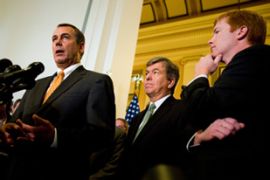Deal eludes US bail-out talks
Members of congress continue negotiations amid scepticism over financial rescue plan.

Several polls this week showed many Americans were sceptical of the package backed by George Bush, the president.
In one poll, 55 per cent of people said they did not believe the government should be responsible for bailing out private companies with taxpayers’ money, even if the collapse could damage the economy.
Bush assurance
Bush told citizens in his weekly radio address that he understood taxpayer frustration for being asked “to pay for mistakes on Wall Street”.
|
“The failure of the financial system would mean financial hardship for many [Americans]” George Bush, US president |
Seeking to persuade Americans to support the deal, he said: “The failure of the financial system would mean financial hardship for many of you.
“The result would be less economic growth and more American jobs lost. And that would put our economy on the path toward a deep and painful recession.”
The plan originally put forward by Henry Paulson, the US treasury secretary, was criticised for failing to provide enough oversight.
That plan would have largely awarded Paulson powers to use the multi-billion dollar sum of taxpayers’ money to buy up bad debt, such as mortgages, held by any financial institution for two years.
Bush assured voters in his radio address that over time the value of those assets would rise again.
“This means that the government will be able to recoup much, if not all, of the original expenditure,” he said.
Republicans in the House have, meanwhile, put forward a rival plan calling for an expanded insurance system financed by banks to rescue individual home mortgages, so that taxpayers do not have to fund the bail-out.
John Boehner, the House Republican leader, said the alternative proposal “reflects the core free-market, pro-taxpayer principles of our party”.
International concern
Other governments have watched the protracted talks closely, concerned the financial turmoil could spread.
Wen Jiabao, China’s prime minister, on Saturday called for international co-operation to resolve the crisis, saying Beijing’s contribution would be to maintain its own economic stability.
“All countries must strengthen their co-operation. They must all take proactive measures to deal with the crisis,” he said at a meeting organised by the World Economic Forum in the north Chinese city of Tianjin.
Gordon Brown, the UK’s prime minister, on Friday assured Bush that “Britain supports the financial plan – and whatever the details of it, it’s the right thing to do to take us through these difficult circumstances”.